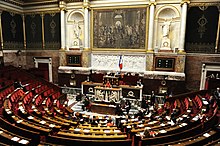National Assembly Assemblée nationale | |
|---|---|
| 17th legislature of the Fifth French Republic | |
 | |
| Type | |
| Type | of the French Parliament |
| History | |
| Founded | 4 October 1958 |
| Preceded by | National Assembly (French Fourth Republic) |
| Leadership | |
| Structure | |
| Seats | 577 |
 | |
Political groups | Government (211)
Opposition (364) Vacant (2)
|
| Elections | |
| Two-round system | |
Last election | 30 June and 7 July 2024 |
| Meeting place | |
 | |
| Palais Bourbon, Paris | |
| Website | |
| www | |
| Rules | |
| Règlement de l'Assemblée nationale | |
| This article is part of a series on |
 |
|---|
|
|
The National Assembly (French: Assemblée nationale, [asɑ̃ble nɑsjɔnal]) is the lower house of the bicameral French Parliament under the Fifth Republic, the upper house being the Senate (Sénat). The National Assembly's legislators are known as députés ([depyte]), meaning "delegate" or "envoy" in English; etymologically, it is a cognate of the English word deputy, the standard term for legislators in many parliamentary systems.
There are 577 députés, each elected by a single-member constituency (at least one per department) through a two-round system; thus, 289 seats are required for a majority. The president of the National Assembly, currently Yaël Braun-Pivet, presides over the body. The officeholder is usually a member of the largest party represented, assisted by vice presidents from across the represented political spectrum. The National Assembly's term is five years; however, the president of France may dissolve the assembly, thereby calling for early elections, unless it has been dissolved in the preceding twelve months. This measure has become rarer since the 2000 French constitutional referendum reduced the presidential term from seven to five years; in the four elections between 2002 and 2017, the president of the Republic has always had a coattail effect delivering a majority in the assembly election two months after the presidential election, and it was accordingly of little benefit to dissolve it. In 2024, it was dissolved following the announcement of the results of the European Parliament election. Due to the separation of powers, the president of the Republic may not take part in parliamentary debates. They can address the Congress of the French Parliament, which meets at the Palace of Versailles, or have the address read by the presidents of both chambers of Parliament, with no subsequent debate.
Following a tradition started by the first National Assembly during the French Revolution, the left-wing parties sit to the left as seen from the president's seat and the right-wing parties to the right; the seating arrangement thus directly indicates the left–right political spectrum as represented in the assembly. The official seat of the National Assembly is the Palais Bourbon on the Rive Gauche of the Seine in the 7th arrondissement of Paris. The Assembly also uses other neighbouring buildings, including the Immeuble Chaban-Delmas on the Rue de l'Université, Paris. Like most institutions of importance in Paris, it is guarded by Republican Guards.
Cite error: There are <ref group=lower-alpha> tags or {{efn}} templates on this page, but the references will not show without a {{reflist|group=lower-alpha}} template or {{notelist}} template (see the help page).